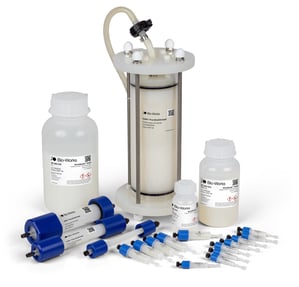Desalting columns
WorkBeads Dsalt resin and the prepacked desalting columns are designed to enable quick and easy separations of high and low molecular weight substances.
Products
Desalting columns with WorkBeads Dsalt resin
Desalting columns that remove salts from protein samples easily
 WorkBeads™ Dsalt resin is designed to enable quick and easy separations of high and low molecular weight substances. This resin allows for efficient desalting and/or buffer exchange of proteins, large peptides, and nucleic acids by group separation of samples before or after various purification steps. The chromatographic desalting technique can be run at high flow rates and can be scaled up for bioproduction. This technique is easy and allows fast scale-up.
WorkBeads™ Dsalt resin is designed to enable quick and easy separations of high and low molecular weight substances. This resin allows for efficient desalting and/or buffer exchange of proteins, large peptides, and nucleic acids by group separation of samples before or after various purification steps. The chromatographic desalting technique can be run at high flow rates and can be scaled up for bioproduction. This technique is easy and allows fast scale-up.
- Designed for rapid and efficient desalting and/or buffer exchange
- Group separation of high molecular weight substances from low molecular weight substances
- Pre-swollen resin for significant time-saving
- Easy scale-up
WorkBeads Dsalt resin is supplied pre-swollen for convenient preparation for column packing. The pre-swollen cross-linked dextranbased resin is optimized for desalting and/or buffer exchange. This result is achieved by group separation of high molecular weight substances, such as proteins, and low molecular weight substances, such as salts. The exclusion limit of the resin is Mr 5000 for proteins and 10 bp for nucleic acids.
Principle of desalting and buffer exchange
Proteins and many other biomolecules differ greatly in size from salts and other small molecules. Size exclusion chromatography is an efficient technique for the separation of components according to size. WorkBeads Dsalt resin has an approximate exclusion limit of (Mr) 5000 for globular proteins and large peptides, and 10 base pairs (bp) for nucleic acids. Substances that are larger than Mr 5000 do not enter the porous beads and are, therefore, eluted in the void of the column (early elution). Substances smaller than Mr 5000 (e.g., salts, buffer substances, and other low molecular weight additives or impurities) enter the bead pores. Consequently, these substances are delayed (late elution). This mechanism allows group separation of large substances from small substances. A protein can, therefore, be separated from salt and/or buffer substances in the sample and, in the process, be transferred into a solution of choice.
WorkBeads Dsalt resin can be used for buffer exchange or desalting to prepare a sample, e.g., before mass spectrometry analysis, lyophilization, and before/after ion-exchange chromatography. The separation is convenient and very fast, making it an excellent alternative to dialysis when samples need to be processed rapidly to avoid degradation.
WorkBeads give unbeatable results for biomolecule purification
WorkBeads are agarose-based chromatographic resins manufactured using a proprietary method that results in porous beads with tight size distribution and exceptional mechanical stability. Agarose-based matrices have been successfully used for decades in biotechnology purification, from research to production scale, due to their exceptional compatibility with biomolecules, including proteins, peptides, nucleic acids, and carbohydrates. WorkBeads resins are designed for separations requiring optimal capacity and purity.
Don't hesitate to contact us about receiving a sample resin to ensure purification success on your target molecule.